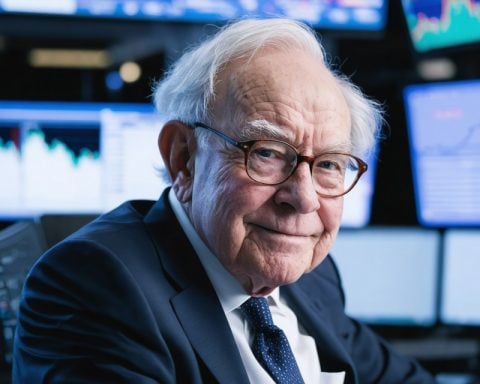- Berkshire Hathaway’s cash reserves have reached an unprecedented $325 billion, showcasing a strategic emphasis on financial caution.
- The investment strategy focuses on three key areas: ownership of 189 subsidiaries, marketable securities, and substantial cash reserves poised for opportunities.
- The cash hoarding strategy reflects caution amid high market valuations and readiness to deploy capital during market downturns.
- Berkshire is expanding its international presence by investing in major Japanese companies, driven by attractive dividends and yen-denominated bonds.
- Warren Buffett’s approach highlights a combination of patience and precise opportunism, balancing cash reserves with strategic acquisitions.
- This strategy reinforces the importance of preparation and adaptability in investment, maintaining readiness for future opportunities.
Imagine sitting atop a mountain of cash so high it eclipses some nations’ GDP. That’s the reality for Berkshire Hathaway, stewarded by the legendary investor Warren Buffett. A formidable $325 billion cash stash now swells its coffers, a record-breaking figure that’s set tongues wagging in the financial world. But why is the Oracle of Omaha in a cash-hoarding spree?
The minds at Berkshire have crafted a trio of investment buckets: the unrivaled control of 189 subsidiary companies, an array of marketable securities, and of course, the burgeoning cash reserves. In the grand symphony of investments, these cash reserves act as an orchestra conducting harmony, ready to cover insurance liabilities or seize opportunity when markets stumble.
This strategic pivot—shedding stakes in American equities while amplifying cash—reflects a keen sense of caution. It reveals their apprehension towards pricey valuations amidst soaring markets. And while Berkshire’s hoarding might seem like a retreat from the stock market’s siren call, it’s actually a mile-deep reservoir of calculated patience.
In parallel, Japan is wooing Buffett with its alluring equities. Five major house names—Mitsubishi, Itochu, Mitsui, Sumitomo, and Marubeni—have been deftly scooped into Berkshire’s basket, woven with yen-denominated bonds. This strategic maneuver, orchestrated since 2019, showcases Buffett’s penchant for hidden gems half a world away. Here, dividends notably outpace borrowing costs. Such precision echoes Buffett’s uncanny ability to spot silver linings amidst clouds, turning yen into a sound symphony of profits.
Berkshire’s strategy reveals a tableau of financial genius: safeguard with cash, pounce on undervalued assets, and capitalize on arbitrage. Buffett’s towering pile of dry powder is not a symbol of timidity but of readiness—what lies ahead requires a stout heart and a nimble strategy.
As the world watches Buffett’s latest moves with bated breath, one lesson stands clear: patience and precision remain his hallmark. A beacon for investors worldwide, this synergy of cash and Japanese savviness underscores a timeless adage—always be prepared for the next, best thing.
Why Warren Buffett’s Cash Strategy is a Masterclass in Financial Foresight
Understanding Berkshire Hathaway’s Cash Strategy
Warren Buffett’s decision to hold a massive $325 billion in cash at Berkshire Hathaway has sparked widespread interest and speculation in the financial community. This strategic choice is not merely about caution but is instead a well-calculated maneuver to position Berkshire for future opportunities. Here, we delve into the nuances of this strategy, explore its implications, and offer actionable insights.
How-To Steps & Life Hacks: Implementing a Cash Reserve Strategy
1. Assess Your Current Financial Position: Understand your income, expenses, and any existing investments. This will help you determine how much you can set aside.
2. Set Clear Savings Goals: Like Berkshire, establish a cash reserve target that aligns with your personal or business financial strategy. This could be a percentage of your total portfolio.
3. Monitor Market Conditions: Keep an eye on market trends and valuations. This will help you identify when it might be a good time to deploy your cash reserves.
4. Diversify Your Investments: While holding cash, also consider diversifying into low-risk bonds or other secure investments that can provide steady returns.
5. Prepare for Opportunity: Stay informed about potential investment opportunities that might arise. Having cash on hand allows you to act quickly when favorable conditions present themselves.
Real-World Use Cases
Buffett’s strategy exemplifies how having a significant cash reserve can allow for strategic maneuvers in both domestic and international markets. By reducing stakes in potentially overvalued American equities and investing in Japanese companies, Buffett leverages geopolitically diverse markets, reducing risk while capitalizing on regional opportunities.
Market Forecasts & Industry Trends
Experts suggest that accumulating cash reserves can be an advisable strategy in times of market uncertainty. With economic indicators pointing towards potential corrections, maintaining liquidity affords investors the ability to capitalize on downturns.
Reviews & Comparisons
Compared to other financial giants, Berkshire Hathaway’s approach is notably conservative. Firms like Apple and Microsoft also hold substantial cash but often reinvest in growth ventures, contrasting Buffett’s more cautious stance.
Controversies & Limitations
While the cash reserve strategy provides safety, it comes at the cost of potential returns seen in bullish markets. Critics argue that excessive cash holdings can lead to missed opportunities in rapidly rising markets.
Features, Specs & Pricing
Berkshire Hathaway’s diversified portfolio includes a mix of wholly owned subsidiaries in various sectors, equities, and bonds, particularly in Japan. This diversification is geared towards mitigating risk and maximizing potential returns across different economic conditions.
Security & Sustainability
Maintaining significant cash reserves is a testament to strong financial security, ensuring that Berkshire is well-prepared for economic downturns. The sustainability of this approach depends on prudent management and constant evaluation of market conditions.
Insights & Predictions
Financial analysts predict that Buffett’s strategy might inspire similar approaches among large corporations, influencing broader market behaviors. The focus on international investments could also spark interest in global diversification.
Tutorials & Compatibility
Investors can emulate Berkshire’s strategy by:
– Creating balanced investment portfolios.
– Regularly reassessing cash reserves against current economic climates.
– Being ready to pivot strategies based on evolving market trends.
Pros & Cons Overview
Pros:
– Financial safety net for economic downturns.
– Flexibility to seize new investment opportunities.
– Reduced risk exposure from market volatility.
Cons:
– Lower potential returns during market upswings.
– Possible perception of missed growth opportunities.
Conclusion: Actionable Recommendations
For investors considering a similar approach:
– Diversify across different asset classes and geographies.
– Stay Informed about market conditions and geopolitical factors.
– Be Ready to deploy cash when the right opportunity arises.
Consistency and readiness define the success of such a strategy, echoing the timeless wisdom of financial preparedness and patience.
For more insights on investment strategies and market trends, visit Berkshire Hathaway.




















